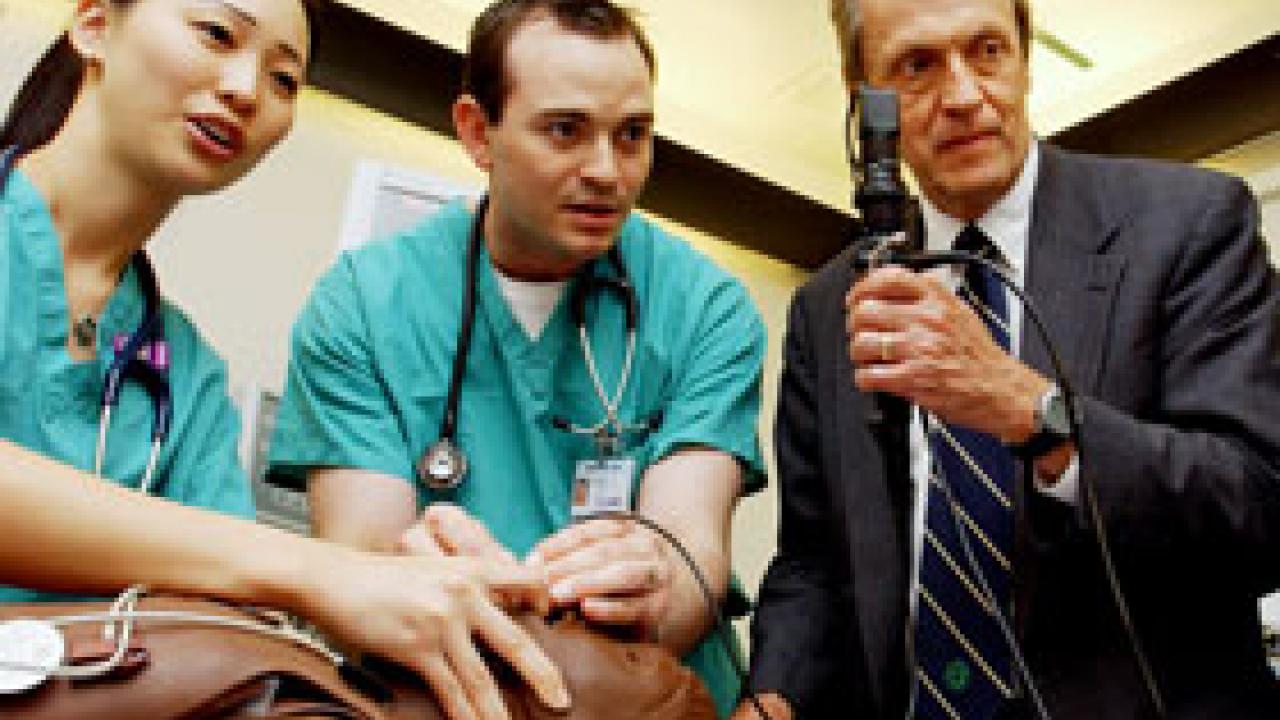He prefers to be called "Bob," once played hockey against the legendary Bobby Orr, and says that the University of California is charged with delivering the "next generation of creators" to society.
UC President Robert Dynes, a physicist who knows something about both semiconductors and serious budget gaps, put his folksy charm on display May 27-28 in his inaugural visit to the campus, which included everything from a morning jog, touring departments and answering tough questions.
On the job now for seven months and already through the crucible of one budget compact, Dynes, who previously served as chancellor of UC San Diego, said he took his new job in the hope of having "impact" on people wide and far--something not always possible in his beloved physics lab.
"The rewards are you guys," he said, pointing to the students on the California Aggie editorial board who asked him questions at "A Dialogue With Robert Dynes," held May 27 at Mondavi Center with about 300 people in attendance. "So I decided to put my body on the rails."
He added, half in jest, "I also believe in buying low, selling high," acknowledging that while the UC system faces significant challenges now, the future looks brighter.
Recovering stability
One reason the future looks brighter, Dynes said, is the recent UC budget compact with Gov. Arnold Schwarzenegger. He called it the best option to "stop the bleeding" that four years of budget cuts have caused, stabilize state support for UC over the next several years, and set the stage for future enrollment growth.
However, Dynes said, "If the economy doesn't recover, we're all in trouble."
About half of the audience members were veterinary students who face fee increases next year of about $4,000 each. A couple of them told Dynes they expect to graduate with student debt of more than $100,000 and yet do not enjoy the salary prospects of other students in law and medicine.
"If I failed in the compact, it is in the area of professional schools," said Dynes, urging the veterinary students to write letters to the governor while also promising to evaluate how future earning potential is related to professional school fees.
The budget compact calls for a systemwide 14 percent fee hike for undergraduates, a 20 percent increase for out-of-state and graduate students and a 30 percent boost for professional students. Under the agreement, fees for resident undergraduates will rise 8 percent in both 2005-06 and 2006-07 to help UC continue its recovery after years of budget cuts.
"What makes more sense is a rational fee policy that is predictable for the next five years," said Dynes, noting that the UC system has the best record nationwide for supporting low-income students.
Asked about how the increasing UC student-to-faculty ratio might be improved, Dynes said the budget compact was the first step to addressing this issue, which he added is a direct result of the slowdown in state funding in recent years. "We will turn around those numbers if the compact is upheld," he said.
He trusts that Schwarzenegger will uphold the agreements in the compact. Yet it is a handshake agreement and not ultimately binding on the state.
"I've come to believe he's a man of his word. He and I looked each other in the eye, and I said, this (compact) is a floor, not a ceiling, right?" said Dynes, noting that the governor agreed that the compact represented only a starting point for potential funding.
One of Dynes' main duties, he said, is making the case for the UC system at the state level. "It's not a cost but an investment," said Dynes in describing his message.
Mulling national lab involvement
Dynes said he would recommend to the UC Board of Regents that it bid for the general-science-oriented Lawrence Berkeley National Laboratory. However, he would have to consider very carefully supporting any bids on the Lawrence Livermore and Los Alamos national labs if the federal government indicates those labs will be used primarily for weapons research in the future.
On academic issues, Dynes foresees an interdisciplinary university system in the 21st century that expands beyond traditional avenues of inquiry. He said that in his own work as a physicist he benefits greatly from scholars in other fields who offer him different perspectives on problems and challenges.
"The most restless people are often the most creative," he said. "These are folks with an idea who may feel frustrated within their own boundaries."
Dynes' wife is also a physicist. "Our evening discussions are a little weird," chuckled Dynes, who grew up in Canada.
He described himself as a "very bad (high school) student" who was distracted by hockey. Once he took to the ice against a team that included hockey Hall-of-Famer Bobby Orr. Dynes quickly discovered he "just wasn't good enough," so he enrolled in college instead of pursuing a professional hockey career.
A first-generation college graduate, Dynes worked for 22 years at AT&T Bell Laboratories. In 1991, he was hired as a professor at UC San Diego. He admittedly thought maybe the academic life would be easier than the private sector.
"But there's no such thing as a nice, cushy faculty job," sad Dynes, adding that he still works in his laboratory and plans to move it to Berkeley from San Diego.
